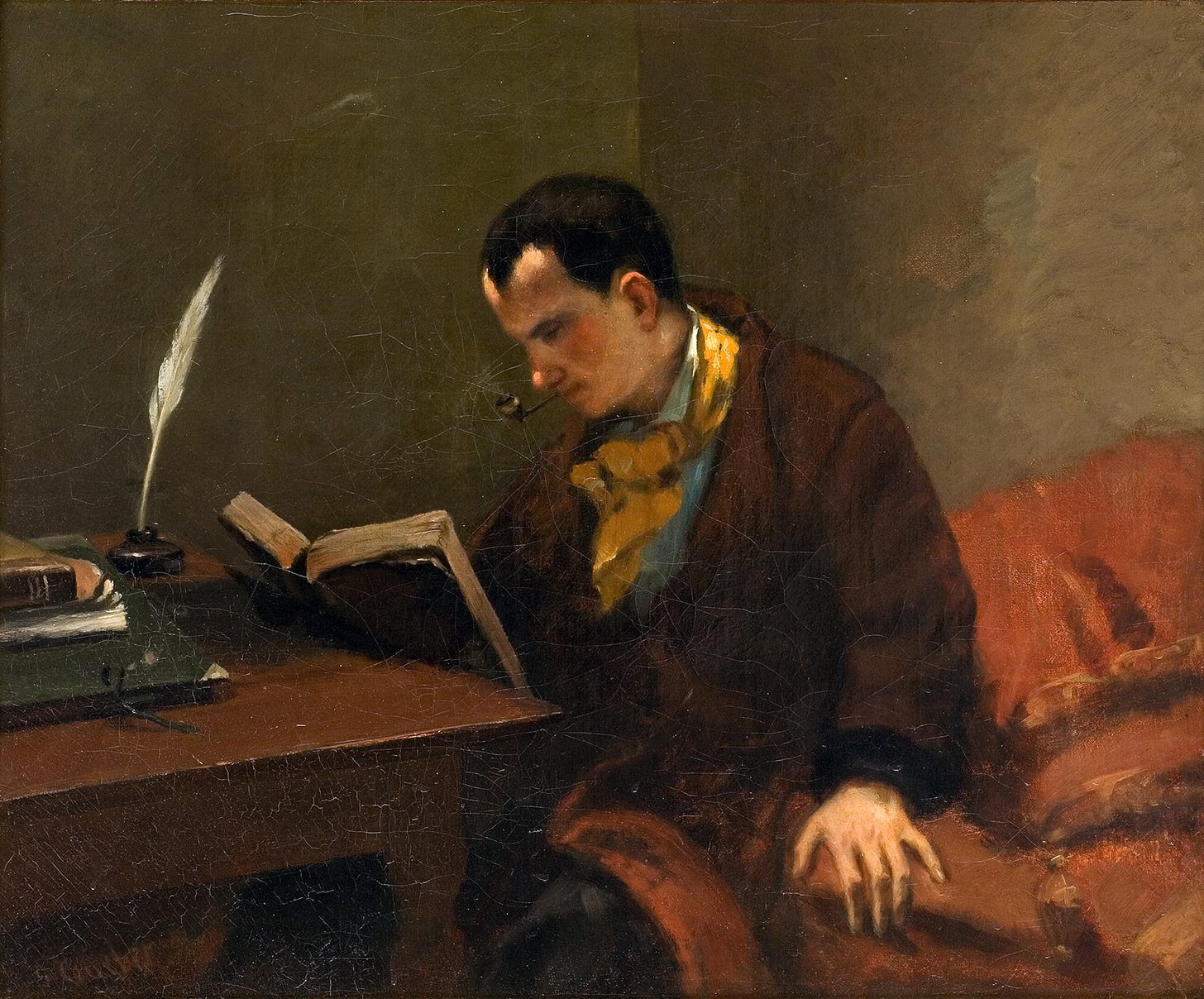How One Should Think About The Relationship Between The Artist And His Theories
A few thoughts I recently put into writing about how I think one should attempt to judge and think about artists and their relationship with their own theories of art.
(Portrait of Charles Baudelaire, Gustave Courbet, 1848)
Art movements can be difficult to understand. The simple reason is that a movement is an abstract formulation of basic ideas, themes, subjects, and technical attributes designed to serve the idea that the art movement seeks to represent through a concrete art form.
When an artist identifies himself as belonging to a specific art movement, he is essentially attempting to concretize the abstract ideas of the movement in a stylized art form applied to a particular subject to the best of his ability.
For example, Ayn Rand said: "My philosophy, in essence, is the concept of man as a heroic being, with his own happiness as the moral purpose of his life, with productive achievement as his noblest activity, and reason as his only absolute." Rand created her art according to these principles. What an artist creates is a concretization of his convictions.
Artists such as Ayn Rand are scarce. To successfully implement one's ideas in an art form is an enormous feat. To translate words into action is a massively difficult task (let alone into a work of art.) The more common case is that an artist (if he is skilled enough) can achieve only a fraction of his ideal, only a few elements and a few successful representations. Very rarely one whole perfect execution is possible. Therefore, it is vital to distinguish between an artist's theories and his art. It is usually challenging to understand what an artist's theory is. Sometimes, even to the artist itself, this isn't entirely clear. One reason is that for many artists, the creation comes first, and sometimes it is almost automatic; there isn't much philosophical thinking about it. It is usually the case that an artist's theory of art comes after the creation itself. Only after the artist has created the artwork can he truly understand what he enjoys and wishes to create.
Creating art is not a linear development. It can take a whole lifespan of searching before one can find his favorite art to make. Artists change their minds. What they created five years ago may not accurately represent the kind of art they want to create. Artists are constantly evolving their technical abilities. New innovations can transform the way art is made; there can be so many different causes for artists to change what kind of art they like to create. Yet, in most cases, a few principles abide. There can be some subjects to which the artist will always want to return. An infamous example is Courbet's return to his childhood village of Ornas. Despite his childhood in the village being incomparable to his life in Paris, he liked to go back there and paint the pastoral village landscapes.
Many different intricacies form an artist's mind. Therefore, judging an artist solely from the perspective of his "manifesto" is problematic. There are other factors at play. It is not the case that an artist writes an essay about his view of how art should be made, and then all of his creations (or even most) follow what he wrote. Many basic principles follow in the rest of his work, but one must rely on more than just a manifesto when trying to understand an artist. If one wishes to do justice to the artworks, and the artists, it requires profound research before one can claim an understanding of their contribution to art history.
---
What I've written here is primarily targeted at my own writing. And my own errors and inaccuracies that I occasionally (and innocently) included in some of my previous writings. A goal I want to set for my study of art history and esthetics is to treat the great artists I am writing about with the utmost respect and intellectual humility. I stand by much of what I've written, but over time, I realized that I'd committed some injustices and historical errors. All this was to be expected. I am still a student.
I am attempting to constantly improve upon my work in the technical aspects of using the English language and in the intellectual aspects of doing more serious research before I can start to write.
I will rewrite some of my older posts that I now view as inaccurate in the future. This medium is a tool for improving my learning and writing skills. Therefore I will not delete old posts because I want to see how much I have improved. These posts are public because I want to allow the public to correct me and because it's an enormous pleasure to engage with my readers in a discussion.
Thank you for reading my thoughts.
All the best,
Yonatan Daon



The artist's sense of life and his philosophical ideas are not always in harmony.
Yonatan, I like your aesthetic inquiries. But I didn't understand your self-inclusion as non-fiction writer, unless I misunderstood that you also write fiction?